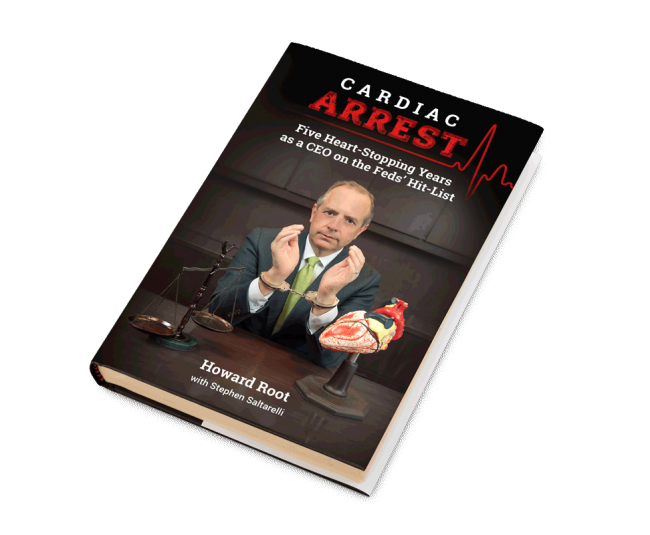Show posts for: The Yates Memo
-
 Read more
Read moreWhen an executive becomes embroiled in a dispute with an employer, the executive tends to take it personally. And when the executive’s conflict is with the government, the executive’s sense of outrage ratchets up even more.
Case in point: the new book from former Vascular Solutions, Inc., CEO Howard Root, titled Cardiac Arrest: Five Heart-Stopping Years as a CEO On the Feds' Hit-List. As the subtitle suggests, Root spent five years under investigation by the Department of Justice in connection with allegations that his company, VSI, engaged in off-label marketing of a medical device for the treatment of varicose veins known as the “Short Kit.”
-
 Read more
Read moreMany of us in the white collar defense bar have written and spoken about the changes wrought by the Yates Memo, but one issue not receiving much attention is the “extraordinary circumstances” exception to the Yates Memo’s application. What is this “extraordinary circumstances” exception?
According to the Memo, “absent extraordinary circumstances, the United States should not release claims related to the liability of individuals based on corporate settlement releases.” This is the much discussed elimination of all-encompassing corporate settlement releases. But the Memo states that there may be “extraordinary circumstances” which justify a corporate settlement that includes releases for the relevant individuals. “Any such release of ... civil liability due to extraordinary circumstances must be personally approved in writing by the relevant Assistant Attorney General or United States Attorney.”
-
 Read more
Read moreThe Department of Justice’s recent Yates Memo creates a new emphasis on individual accountability for corporate or entity wrongdoing. It also enhances the risk to corporate employees that they will need to choose between cooperating with an employer’s investigation—and potentially incriminating themselves—or asserting their Fifth Amendment right to remain silent and risking their jobs. (For examples of this dilemma, see our posts here and here.)
But being fired for “taking the Fifth” is not a recent phenomenon.
In the last century, this issue arose in the 1950s, when employment contracts more commonly contained “good conduct” or “morals” clauses.
-
 Read more
Read moreAn employee who is accused of participating in corporate wrongdoing can face potentially life-changing choices almost immediately. When a company learns of alleged wrongdoing, it is likely to start an internal investigation into the misconduct. As part of the investigation, attorneys or other investigators will seek to interview those with relevant knowledge, including employees who are allegedly involved in the wrongdoing.
When that happens, the employees face a critical choice: do I stay silent, or do I talk to the investigators? If the employees refuse to talk, they could be fired; if they do talk, the government could use their statements against them in a criminal case.
-
 Read more
Read moreWhen a company learns that its employees may have done something unlawful, it should try to get the facts and figure out whether wrongdoing actually occurred. One way to do this is to conduct an internal investigation, in which attorneys or other investigators collect documents and interview employees to gather information about what happened.
But what happens when employees refuse to cooperate? Can they be fired and denied severance benefits that would otherwise have been due?
-
 Read more
Read moreWhen the Department of Justice announces new guidance for individual and corporate prosecutions, the white collar bar takes notice.
Thus, in September 2015, when the Department of Justice released a memorandum titled “Individual Accountability for Corporate Wrongdoing”—now colloquially known as “the Yates Memo” because it was authored by Deputy Attorney General Sally Yates—almost everyone had something to say about it.
The Yates Memo seeks to increase the emphasis on individual accountability for corporate wrongdoing from the outset of a government investigation. It sets forth six steps to strengthen pursuit of individuals by criminal and civil prosecutors, including requiring corporations to lay out all relevant facts related to individual misconduct in order to obtain cooperation credit.
-
 Read more
Read moreWe’ve counted down our top posts from 2015, from American Apparel to Dr. Robert Schuller. Now, we look at the issues in executive disputes that are likely to draw the most attention in 2016.
-
 Read more
Read moreIn my last post, I boldly predicted a possible winner—a dark horse if you will—emerging from the new Department of Justice policy announced by Deputy Attorney General Sally Yates and immortalized in the so-called Yates memo.
But this post is less optimistic. Today, I’m talking about the sure loser post-Yates: the upper-middle executive.
Or, as Ms. Yates memorably described to The New York Times, the Vice President in Charge of Going to Jail.
What does the Yates memo do to squeeze the upper-middle executive like never before?
-
 Read more
Read moreIn the corporate world, the treats offered to executives can be as sweet as stock incentives and cash bonuses. But the tricks can be as sour as individual liability for wrongdoing and salary disgorgement.
NJ Supreme Court Makes It Easier For Employers To Take Back Executive Salaries
Lately, we’ve been discussing the Yates Memo and the alarms it must be sounding in corporate board rooms across the country. In a similar vein, the New Jersey Supreme Court offered little comfort to spooked executives when it recently decided to broaden the remedies available to employers who seek disgorgement of former high-level employees’ salaries. -
 Read more
Read moreOn September 9, 2015, Deputy Attorney General Sally Q. Yates issued a memorandum to all Department of Justice attorneys concerning “Individual Accountability for Corporate Wrongdoing.” Referred to as the “Yates Memo,” the memorandum consolidates several statements from other DOJ officials over the past year, memorializes new policy, and reiterates long-established practices. Significantly, the Yates Memo recognizes what every American has understood since the inception of our legal system: living, breathing individuals commit crimes or engage in civil misconduct, not the business entities (fictional “persons”) on behalf of which the individual acts.
As the regulatory and business environments in which our clients operate grow increasingly complex, we identify and offer perspectives on significant legal developments affecting businesses, organizations, and individuals. Each post aims to address timely issues and trends by evaluating impactful decisions, sharing observations of key enforcement changes, or distilling best practices drawn from experience. InsightZS also features personal interest pieces about the impact of our legal work in our communities and about associate life at Zuckerman Spaeder.
Information provided on InsightZS should not be considered legal advice and expressed views are those of the authors alone. Readers should seek specific legal guidance before acting in any particular circumstance.
Contributing Editors

John J. Connolly
Partner
Email | +1 410.949.1149

Andrew N. Goldfarb
Partner
Email | +1 202.778.1822

Sara Alpert Lawson
Partner
Email | +1 410.949.1181

Nicholas M. DiCarlo
Associate
Email | +1 202.778.1835




